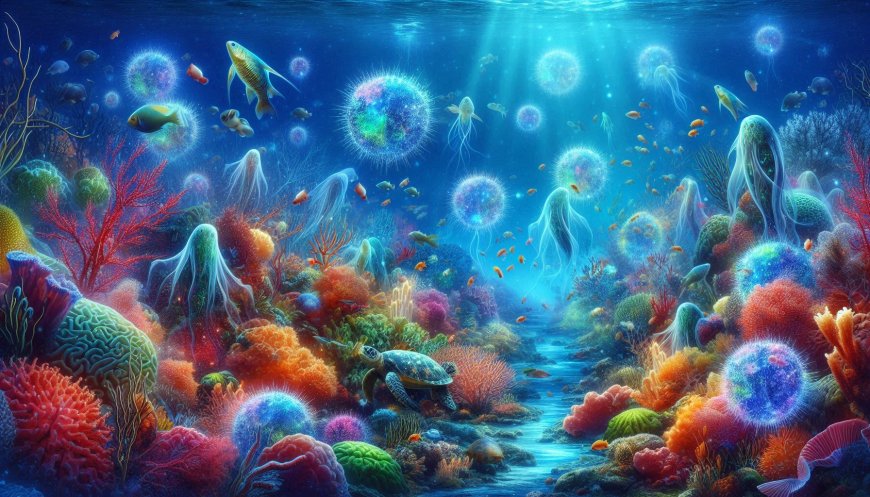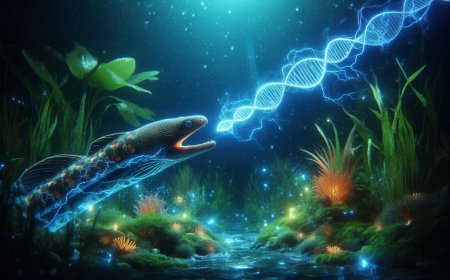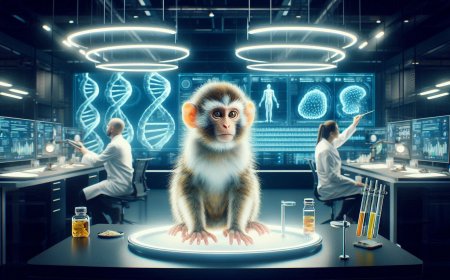The Hidden Guardians of the Ocean: How Tiny Viruses Shape Our Planet
Explore the fascinating role of tiny viruses as the hidden guardians of the ocean, shaping marine ecosystems and maintaining ecological balance. Discover how these microscopic entities influence ocean life and contribute to our planet's health.

Beneath the shimmering surface of the ocean lies a bustling world of life—and the most abundant residents are not fish or plankton, but viruses. These microscopic entities, numbering in the millions per milliliter of seawater, are the ocean's unsung heroes. Despite their size, ocean viruses have a monumental impact on marine ecosystems and even the global climate.
At first glance, it’s easy to underestimate their importance. After all, viruses are often thought of as harmful, spreading disease and destruction. But in the ocean, they play a very different role—one that’s crucial for the health of marine life and the planet’s balance.
The Invisible Hand of Ocean Viruses
Marine viruses primarily target microorganisms like bacteria and algae. By infecting and "lysing" (bursting) these cells, viruses unleash a cascade of effects that ripple through the ecosystem. When these infected cells burst, they release organic matter back into the water, in a process scientists call the "viral shunt." Instead of carbon and nutrients moving up the food chain to larger marine animals, they are recycled right at the microbial level. This ensures that nutrients remain available for the smallest creatures, supporting the base of the ocean’s food web.
In this way, viruses act like invisible regulators, maintaining the delicate balance of marine ecosystems. Without them, populations of bacteria and algae could spiral out of control, disrupting the food chain and depleting essential resources for other organisms.
A Diverse and Dynamic Oceanic World
The diversity of ocean viruses is staggering. Thousands of species have been identified, each infecting different marine hosts, from the tiniest bacteria to larger plankton. This incredible variety is vital for keeping the ecosystem in check. The presence of so many different viruses ensures that no single microorganism dominates, fostering a more resilient and dynamic marine environment.
But viruses don’t just control populations—they also facilitate evolution. Through a process called horizontal gene transfer, viruses can carry genes from one host to another. This allows for the rapid spread of genetic material across species, promoting adaptation and resilience in marine organisms. Some viruses even carry genes that enhance their host’s metabolic abilities, helping them thrive in changing environments and impacting critical processes like nutrient cycling.
The Viral Shunt: A Key Player in Marine Food Webs
One of the most fascinating roles viruses play is in supporting the ocean’s microbial loop. When viruses burst microbial cells, the organic matter released becomes food for other microorganisms. This recycling process helps drive primary production, the foundation of life in the ocean. In turn, it supports everything from the smallest plankton to the largest whales.
Viruses also act as population managers, ensuring that no single species becomes too dominant. By infecting certain microorganisms, they keep populations in check, creating a balanced environment where different species can coexist and thrive. This fine-tuned control is essential for maintaining the diversity and productivity of marine ecosystems.
A Key to Climate Regulation
The impact of ocean viruses extends far beyond the water. They play a critical role in the ocean’s carbon cycle, influencing how carbon is stored in the deep sea. When viruses lyse cells, they release organic carbon, some of which sinks into the depths of the ocean, effectively trapping it there. This process helps sequester carbon, keeping it out of the atmosphere and mitigating the effects of climate change.
Understanding the role of ocean viruses in carbon cycling is vital for climate science. As we continue to grapple with the impacts of rising CO2 levels, the ocean’s ability to absorb and store carbon becomes ever more important. Viruses, in their silent and invisible way, are key players in this global process.
The Ocean’s Viral Pulse
The next time you gaze out at the vast expanse of the ocean, remember the teeming world of viruses just below the surface. These tiny, often-overlooked entities are responsible for maintaining the delicate balance of marine ecosystems and, in turn, supporting life on Earth. They regulate populations, recycle nutrients, and even influence the planet’s climate.
In their own way, ocean viruses are the silent guardians of our planet, showing us that sometimes, the most important things are the ones we can’t even see.
What's Your Reaction?






































































































